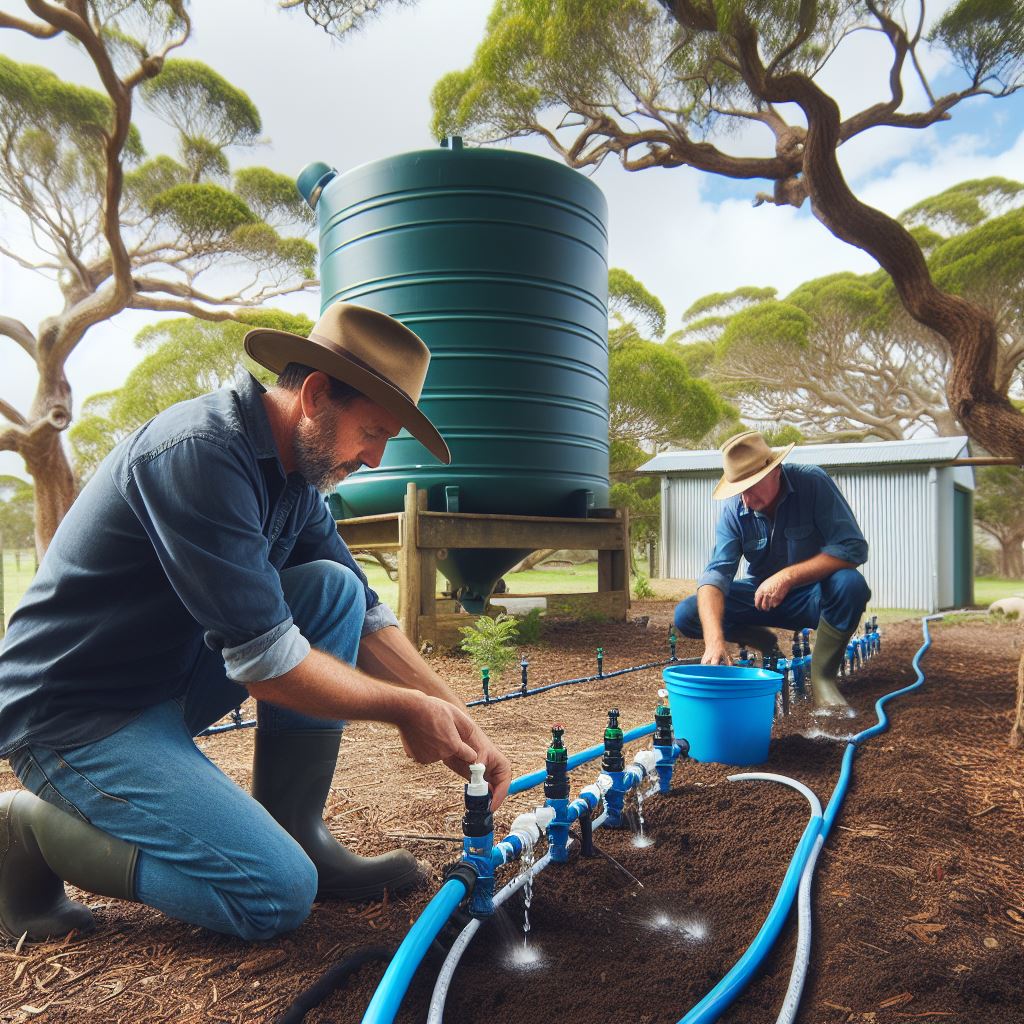Introduction
Sustainable farming practices play a crucial role in Australia, ensuring long-term environmental health and agricultural productivity.
By adopting sustainable methods, farmers can minimize the negative impact on the ecosystem while maximizing yields.
A. Importance of sustainable farming practices in Australia
Sustainable farming practices are essential in Australia due to its unique climate and fragile environment.
With increasing concerns about climate change, water scarcity, and biodiversity loss, sustainable farming ensures the preservation of natural resources and ecosystems.
B. Brief overview of the topic
Sustainable farming practices involve cultivating crops and rearing livestock while minimizing harmful effects on the environment.
This includes using organic fertilizers, conserving water, promoting biodiversity, and reducing pollution.
Such practices aim to maintain soil fertility, protect waterways, and ensure the long-term viability of farming.
In Australia, sustainable farming practices have gained significant importance over the years.
With its diverse landscapes and varying climatic conditions, the country faces numerous challenges such as soil erosion, salinity, and water scarcity.
Sustainable practices can mitigate these issues by promoting soil conservation, efficient water management, and the use of renewable energy.
Additionally, sustainable farming practices contribute to the overall well-being of communities by creating healthier environments and improving the quality of agricultural products.
These practices also support rural economies by enhancing productivity and ensuring the long-term viability of farming operations.
In essence, sustainable farming practices are crucial for the ongoing success of agriculture in Australia.
They protect the environment, preserve natural resources, and support the economic and social well-being of farming communities.
By adopting sustainable practices, Australian farmers can secure a sustainable future for themselves and the generations to come.
Definition of Sustainable Farming Practices
Sustainable farming practices in Australia are vital for the health of the environment and the future of agriculture.
By definition, sustainable farming practices refer to methods that can be carried out over the long term without depleting natural resources or harming the ecosystem.
These practices aim to maintain the balance between agriculture and the environment, ensuring that farming can continue in a way that is economically viable, socially responsible, and environmentally friendly.
Sustainable agriculture, as a broader concept, involves the integration of three main factors: environmental stewardship, economic profitability, and social responsibility.
It seeks to address the challenges faced by modern agriculture, such as soil degradation, water scarcity, and climate change, while also considering the social impacts of farming practices on communities and workers.
A. Environmental Stewardship
One of the key principles of sustainable farming is the preservation and enhancement of natural resources.
This includes protecting soil health through practices like crop rotation, cover cropping, and reduced tillage.
These methods help to prevent soil erosion, increase water penetration, and promote nutrient cycling, leading to healthier and more productive farmlands.
In addition, sustainable farming practices prioritize water conservation, aiming to minimize water usage through techniques such as drip irrigation and rainwater harvesting.
B. Economic Profitability
Sustainable farming practices also aim to ensure the economic viability of agricultural operations.
This involves maximizing productivity while reducing costs and minimizing reliance on external inputs.
Farmers can achieve this by adopting efficient farming techniques, utilizing integrated pest management strategies, and embracing technologies that optimize resource utilization.
By enhancing farm efficiency and reducing waste, farmers can improve profitability while minimizing their environmental footprint.
Your Personalized Career Strategy
Unlock your potential with tailored career consulting. Get clear, actionable steps designed for your success. Start now!
Get StartedC. Social Responsibility
Another important aspect of sustainable farming is its focus on social equity and community well-being.
Farmers are encouraged to establish fair labor practices, prioritize the welfare of farm workers, and engage with local communities.
Sustainable farming practices also seek to enhance food security, ensuring that nutritious and affordable food is accessible to all.
By supporting local markets, promoting diverse farming systems, and fostering rural development, sustainable agriculture contributes to the overall social and economic development of farming communities.
In Australia, sustainable farming practices are supported by various programs and initiatives.
The government provides grants and subsidies to encourage farmers to adopt sustainable methods, such as organic farming, regenerative agriculture, and agroforestry.
Research institutions and agricultural extension services play a crucial role in knowledge dissemination, providing farmers with the latest scientific advancements and best practices in sustainable agriculture.
Overall, sustainable farming practices in Australia are essential for the long-term sustainability of the agricultural sector.
By adopting environmentally friendly practices, ensuring economic viability, and promoting social responsibility, farmers can contribute to a sustainable and resilient food system.
As consumers, we also play a vital role in supporting sustainable farming by making conscious choices when purchasing food and supporting local, sustainable agriculture.
Together, we can work towards a future where farming meets the needs of the present without compromising the ability of future generations to meet their own needs.
The Current State of Agriculture in Australia
A. Overview of the agriculture industry in Australia
- Agriculture is an essential part of Australia’s economy, contributing to employment and export revenue.
- Major agricultural sectors in Australia include cattle farming, sheep farming, grain farming, dairy farming, and horticulture.
- Australia is known for its high-quality agricultural products, which are in demand both domestically and internationally.
- Farmers in Australia often face challenges such as unpredictable weather patterns, droughts, and pests.
B. Challenges faced by farmers
- Climate change has led to more frequent and intense weather events, impacting agricultural productivity.
- Droughts pose a significant risk to farming operations, leading to water scarcity and reduced crop yields.
- Pests, diseases, and invasive species can devastate crops and livestock, resulting in financial losses for farmers.
- Rural communities often lack access to essential services and infrastructure, making it harder for farmers to succeed.
C. Need for sustainable farming practices
- Sustainable farming practices are crucial to mitigate the environmental impact of agriculture and ensure its long-term viability.
- Conservation of natural resources, such as water and soil, is essential for sustainable agriculture.
- Implementing efficient irrigation techniques can reduce water usage and preserve water resources.
- Adopting organic farming methods and reducing chemical usage promotes healthier soil and reduces pollution.
- Integrating biodiversity conservation measures into farming practices helps maintain ecosystem resilience.
- Investing in research and innovation can lead to the development of more sustainable farming technologies and practices.
- Farmers can diversify their income by exploring alternative agricultural markets and value-added products.
- Government support in the form of subsidies, grants, and education programs can encourage farmers to adopt sustainable practices.
- Consumer awareness and demand for sustainably produced food can drive market incentives for farmers.
- Collaboration between farmers, scientists, and agricultural organizations is essential for knowledge sharing and best practices.
In general, the agriculture industry in Australia plays a vital role in the economy, but it faces multiple challenges.
Implementing sustainable farming practices is crucial to address these challenges, ensuring the long-term viability of agriculture while minimizing its environmental impact.
Through conservation, innovation, and collaboration, Australian farmers can navigate the changing landscape and contribute to a sustainable future.
Benefits of Sustainable Farming Practices
A. Environmental Benefits
- Mitigates soil erosion, preserving fertile land.
- Reduces pollution from chemicals, protecting waterways.
- Minimizes habitat destruction, safeguarding ecosystems.
B. Soil Conservation and Improved Water Quality
- Enhances soil structure and fertility.
- Prevents soil degradation and loss.
- Improves water retention and filtration capacity.
C. Preservation of Biodiversity
- Maintains diverse ecosystems on farmland.
- Protects native flora and fauna habitats.
- Promotes genetic diversity in crops and livestock.
D. Reduced Greenhouse Gas Emissions
- Lowers carbon footprint through sustainable practices.
- Minimizes methane and nitrous oxide emissions.
- Mitigates climate change impacts on agriculture.
E. Economic Benefits
- Increases long-term profitability for farmers.
- Reduces production costs through efficiency gains.
- Fosters resilience to market volatility.
F. Improved Soil Fertility and Productivity
- Builds organic matter content in soils.
- Boosts nutrient cycling and availability.
- Enhances crop yields and quality.
G. Cost Savings Through Reduced Input Use
- Decreases reliance on synthetic fertilizers and pesticides.
- Saves on water and energy consumption.
- Cuts down on waste disposal costs.
H. Market Access and Premium Prices for Sustainable Products
- Captures growing consumer demand for ethical products.
- Expands export opportunities in eco-conscious markets.
- Commands premium prices for sustainably produced goods.
I. Social Benefits
- Promotes community engagement and collaboration.
- Strengthens relationships between farmers and consumers.
- Fosters pride in stewardship of the land.
J. Healthier Communities
- Provides access to fresh, nutritious food locally.
- Reduces exposure to harmful chemicals in food.
- Enhances overall well-being and quality of life.
K. Enhanced Livelihoods for Farmers
- Diversifies income streams through value-added products.
- Builds resilience against environmental and economic shocks.
- Improves job satisfaction and retention.
L. Food Security and Resilience
- Ensures stable food production in changing climates.
- Reduces dependency on external inputs and imports.
- Strengthens food sovereignty and self-sufficiency.
To summarize, embracing sustainable farming practices in Australia not only safeguards the environment but also reaps numerous economic, social, and health benefits for both farmers and society at large.
Read: Youth in Farming: Australia’s New Generation

Sustainable Farming Techniques and Practices Used in Australia
Australia, with its vast agricultural landscapes, has become a global leader in sustainable farming practices.
By implementing innovative and eco-friendly techniques, Australian farmers are ensuring the long-term viability of their farms while preserving the environment.
Here are some of the sustainable farming practices adopted in Australia:
- Organic Farming: Australian farmers are increasingly adopting organic farming methods, which eliminate the use of synthetic fertilizers and pesticides.
- Conservation Tillage: Conservation tillage helps minimize soil erosion by reducing soil disturbance during planting while still ensuring optimal crop growth.
- Integrated Pest Management: Australian farmers utilize integrated pest management techniques to control pests and diseases effectively while minimizing chemical use.
- Precision Agriculture: Precision agriculture utilizes technology to enhance crop management by analyzing data and applying inputs only where necessary, reducing waste.
- Agroforestry: Agroforestry involves integrating trees into farming systems, providing shade, preventing soil erosion, and improving overall farm productivity.
- Water and Irrigation Management: Australian farmers focus on efficient water use by implementing advanced irrigation techniques, such as drip irrigation and soil moisture monitoring.
- Livestock Management Practices: Farmers in Australia prioritize animal welfare by implementing sustainable livestock management practices, including rotational grazing and providing a healthy diet.
A. Organic Farming
Australia’s organic farming industry has experienced remarkable growth in recent years.
By avoiding the use of synthetic inputs, organic farmers contribute to a healthier environment by reducing chemical contamination.
They rely on natural methods to nurture and protect their crops, such as crop rotation, composting, and biological pest control.
Organic farming also promotes biodiversity as it encourages the existence of beneficial insects and birds, which act as natural pest predators.
B. Conservation Tillage
Conservation tillage, also known as no-till farming, has gained popularity among Australian farmers due to its numerous environmental benefits.
By leaving crop residues on the field and reducing soil disturbance, conservation tillage minimizes erosion and maintains soil structure and fertility.
This method also helps to retain moisture in the soil, decreasing the risk of drought stress.
Stand Out with a Resume That Gets Results
Your career is worth more than a generic template. Let us craft a resume and cover letter that showcase your unique strengths and help you secure that dream job.
Get HiredAdditionally, conservation tillage reduces fuel usage, greenhouse gas emissions, and overall energy consumption, making it a more sustainable farming practice.
C. Integrated Pest Management
Australia has embraced integrated pest management (IPM) to reduce the reliance on chemical pesticides and develop a more sustainable approach to pest control.
IPM involves a combination of strategies, including crop rotation, biological control, habitat manipulation, and targeted pesticide application.
By monitoring pest populations and implementing a range of control methods, Australian farmers effectively manage pests while minimizing the impact on the environment and human health.
D. Precision Agriculture
In the era of advanced technology, Australian farmers have embraced precision agriculture to optimize resource use and reduce agriculture’s ecological footprint.
Through the use of GPS, sensors, and data analysis, farmers can precisely manage their fields, applying fertilizers and pesticides only where needed.
This targeted approach improves nutrient efficiency, reduces chemical runoff, and minimizes environmental pollution, all while maintaining crop productivity.
E. Agroforestry
Incorporating trees into agricultural systems, agroforestry offers numerous environmental benefits.
In Australia, farmers adopt agroforestry practices such as windbreaks and shelterbelts to protect their crops from strong winds and reduce soil erosion.
Additionally, agroforestry helps sequester carbon dioxide, mitigating climate change, and provides habitat for wildlife.
By combining trees with farming practices, Australian farmers enhance the sustainability and resilience of their agricultural landscapes.
F. Water and Irrigation Management
Australia, known for its arid climate, faces challenges in water availability.
To ensure sustainable water use, farmers implement innovative irrigation management practices.
They employ tools and technologies such as drip irrigation, which delivers water directly to the plant’s roots, reducing water wastage.
Soil moisture monitoring systems enable farmers to apply water when and where needed, avoiding over-irrigation.
By adopting efficient irrigation techniques, Australian farmers conserve water resources and reduce the strain on ecosystems.
G. Livestock Management Practices
Australian farmers prioritize sustainable livestock management practices to ensure animal welfare and reduce the environmental impact of animal production.
They employ rotational grazing systems that allow pastures to recover naturally, preventing soil degradation and maintaining forage quality.
Additionally, farmers focus on providing a balanced diet for their animals, reducing the need for excessive supplementary feed.
By implementing sustainable livestock practices, Australian farmers promote both animal health and environmental conservation.
Essentially, Australian farmers have made significant strides in adopting sustainable farming practices.
Through the implementation of organic farming, conservation tillage, integrated pest management, precision agriculture, agroforestry, water and irrigation management and sustainable livestock practices, Australia’s agricultural sector is leading the way towards a more environmentally conscious future.
Success Stories of Sustainable Farming in Australia
In the vast Australian agricultural landscape, several individuals and organizations have embraced sustainable farming practices.
Let’s delve into some inspiring success stories showcasing their commitment to environmental stewardship and innovation:
A. Examples of individual farmers or organizations practicing sustainable farming
- Greenhill Farms: This family-owned farm in Victoria has implemented regenerative agriculture techniques, such as rotational grazing and cover cropping, to improve soil health and biodiversity.
- Outback Organics: Operating in remote areas of Western Australia, this pioneering enterprise utilizes solar-powered irrigation systems and permaculture principles to grow organic crops sustainably.
- EcoGrow Collective: Based in Queensland, this cooperative of small-scale farmers specializes in agroforestry and polyculture farming, promoting biodiversity while providing local communities with diverse, nutritious produce.
- Sustainable Seafood Solutions: Along the coastlines, aquaculture initiatives like this one in Tasmania prioritize ecosystem health by employing responsible fishing practices and minimizing environmental impact.
B. Positive outcomes and achievements
- Increased Soil Fertility: Through practices like crop rotation and no-till farming, these sustainable farms have seen significant improvements in soil structure, fertility, and water retention, leading to higher yields and reduced erosion.
- Biodiversity Conservation: By integrating native vegetation corridors and implementing wildlife-friendly farming practices, these initiatives have fostered diverse ecosystems, supporting pollinators, beneficial insects, and native fauna.
- Carbon Sequestration: Adopting carbon farming techniques such as agroforestry and rotational grazing has enabled these farms to sequester carbon dioxide from the atmosphere, mitigating climate change while enhancing soil carbon levels.
- Community Engagement: These sustainable farming endeavors actively engage with local communities through educational programs, farm tours, and farmers’ markets, fostering awareness and appreciation for sustainable agriculture while supporting rural economies.
To sum it up, the success stories of sustainable farming in Australia exemplify the transformative potential of adopting environmentally conscious practices.
Through innovation, collaboration, and a commitment to stewardship, these individuals and organizations are not only safeguarding the land for future generations but also demonstrating that sustainable agriculture is not just a necessity but a rewarding endeavor yielding tangible benefits for both people and the planet.
Transform Your LinkedIn for Maximum Impact
Elevate your professional brand with a LinkedIn profile that attracts recruiters, showcases your expertise, and maximizes opportunities. Stand out in your industry with a profile built for success.
Boost ProfileRead: Farm-to-Table Movement: An Australian Perspective
Potential Challenges and Barriers to Adopting Sustainable Farming Practices
Potential challenges and barriers to adopting sustainable farming practices in Australia can be categorized into economic, knowledge and education, policy and regulatory, and technological limitations.
Economic factors can pose a significant challenge for farmers looking to adopt sustainable farming practices.
Implementing these practices often requires significant financial investment, such as purchasing new equipment or modifying existing infrastructure.
The initial costs can be prohibitive for many farmers, particularly small-scale producers who may already operate on tight budgets.
A. Lack of knowledge and education
Lack of knowledge and education is another barrier to the widespread adoption of sustainable farming practices.
Many farmers may not be aware of the benefits of these practices or may not have access to information and training on how to implement them effectively.
Education and extension services play a crucial role in providing farmers with the necessary knowledge and skills to adopt sustainable practices.
B. Policy and regulatory barriers
Policy and regulatory barriers can also hinder the adoption of sustainable farming practices.
In some cases, existing policies and regulations may not support or incentivize sustainable practices.
Farmers may face bureaucratic hurdles to obtain permits or licenses necessary for implementing certain sustainable practices.
A lack of coordination and collaboration between different government bodies and agencies can further complicate the policy landscape.
C. Technological limitations
Technological limitations can pose challenges for farmers looking to adopt sustainable farming practices.
Some sustainable practices, such as precision agriculture or advanced irrigation systems, rely heavily on technology and require farmers to have access to relevant tools and equipment.
However, not all farmers have access to or can afford the latest technological advancements, limiting their ability to adopt these practices.
Despite these challenges and barriers, there has been a growing recognition of the need for sustainable farming practices in Australia.
Efforts are being made to address economic barriers through financial assistance programs and grants aimed at supporting farmers in transitioning to sustainable practices.
Education and extension services are also being expanded to provide farmers with the necessary knowledge and skills.
Policy and regulatory barriers are being tackled through the development of more supportive policies, such as incentive schemes and grants.
Governments at various levels are also working to streamline regulations and improve coordination between different agencies to facilitate the adoption of sustainable practices.
Technological advancements continue to drive innovation in sustainable farming practices.
Researchers and industry professionals are developing affordable and accessible technologies that can assist farmers in implementing sustainable practices.
Additionally, knowledge-sharing platforms and networks are being established to facilitate the exchange of information and experiences among farmers.
Basically, while challenges and barriers exist, the adoption of sustainable farming practices in Australia is gaining momentum.
Economic factors, lack of knowledge and education, policy and regulatory barriers, and technological limitations are being addressed through various initiatives and interventions.
With continued support and collaboration from stakeholders, the transition towards sustainable farming practices can be accelerated, ensuring a more resilient and environmentally friendly agricultural sector.
Read: The Economics of Farming in Australia Unveiled
Initiatives and Support for Sustainable Farming in Australia
Sustainable farming practices in Australia have gained significant attention in recent years, with various initiatives and support systems in place to promote a more environmentally friendly and economically viable agricultural industry.
These efforts aim to ensure the long-term well-being of both the land and the farming community.
Below are some key initiatives and support mechanisms that contribute to sustainable farming in Australia:
A. Government programs and policies
- Environmental Stewardship Program: Introduced by the Australian government, this program provides financial incentives and assistance to farmers who engage in sustainable land management practices, such as soil conservation and biodiversity protection.
- Farm Household Allowance: Aimed at supporting farmers during periods of financial stress, this government initiative assists farming families by providing them with income support and access to professional services that help them improve their long-term sustainability.
- National Landcare Program: An Australian government initiative that aims to improve the sustainability of agriculture by funding projects that focus on natural resource management, sustainable farming practices, and the protection of biodiversity.
B. Non-profit organizations
- Landcare Australia: This organization supports community-based initiatives focused on sustainable farming practices, including soil health, water management, and biodiversity conservation.
They provide education, funding, and resources to help farmers adopt sustainable practices. - Sustainable Table: A non-profit organization that educates consumers about the benefits of sustainable farming and the importance of making ethical food choices.
They work closely with farmers to promote regenerative farming practices that prioritize soil health and reduce reliance on chemical inputs.
C. Research and innovation
- Commonwealth Scientific and Industrial Research Organisation (CSIRO): Australia’s national science agency, CSIRO, conducts research and provides scientific expertise to support sustainable agriculture.
Their research focuses on developing resilient farming systems, mitigating climate change impacts, and improving agricultural productivity while minimizing environmental harm. - Future Farmers Network: This organization connects young farmers across Australia, providing them with access to innovative ideas and technologies that help improve the sustainability of their farming practices.
They facilitate knowledge sharing and promote the adoption of sustainable farming techniques among the future generation of farmers.
In short, initiatives and support for sustainable farming in Australia are essential for the long-term viability of the agricultural industry.
Government programs and policies, non-profit organizations, and research and innovation play crucial roles in promoting sustainable farming practices.
By working together, these entities contribute to the preservation of the environment, the economic prosperity of farming communities, and the production of high-quality, sustainable food for the nation.
Read: Indigenous Farming Techniques in Australia
Gain More Insights: Australian Farming: Techniques and Innovations
Conclusion
Sustainable farming practices play a vital role in ensuring the long-term viability of agriculture in Australia.
Throughout this blog section, we have highlighted the importance of these practices and their positive impact on various aspects of farming.
From conserving soil health to reducing water usage, sustainable farming practices contribute to the overall sustainability of the environment.
Additionally, these practices promote the use of natural resources responsibly and help combat the effects of climate change.
It is crucial for more farmers to adopt sustainable practices to ensure a sustainable future for Australian agriculture.
By implementing techniques such as crop rotation, organic fertilizers, and integrated pest management, farmers can minimize their environmental footprint.
Government incentives and educational programs can further encourage farmers to embrace sustainable farming practices.
With collective efforts, we can foster a resilient agricultural sector that thrives in harmony with nature and safeguards future generations.
In closing, sustainable farming practices are not only beneficial for the environment but also for the long-term success of the farming industry in Australia.
Let us work together towards a sustainable future, one farm at a time.




